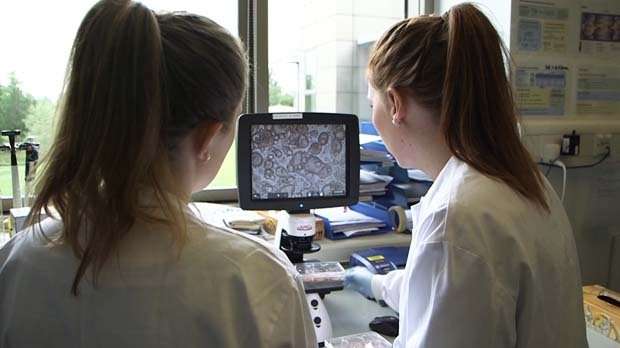Lab-grown 'mini tumours' could personalise cancer treatment

Testing cancer drugs on miniature replicas of a patient's tumour could help doctors tailor treatment, according to new research.
Researchers treated the lab-grown 'mini tumours' with a range of drugs. They then looked to see how this compared to how successful treatment was in those patients. The approach found a drug that had a chance of shrinking a patient's tumour in almost 9 in 10 cases.
Drugs that didn't work in patients also had no effect on the mini tumours. This suggests they could help predict when drugs won't work.
The research, led by scientists at The Institute of Cancer Research (ICR), London and published in Science, was carried out in bowel and stomach cancers, and other cancers of the digestive system.
The results of the study didn't change how patients were treated. But the approach could be used in the future to help choose treatment.
Dr. Nicola Valeri, who led the study, said that the technique needed to be tested in large clinical trials, but that it "has the potential to help deliver truly personalised treatment."
What are 'mini tumours'?
Mini tumours, also called organoids, are tiny balls of cancer cells grown in the lab.
They can be grown from a tissue sample (biopsy). Scientists take cells from a tumour and place them inside a gel, where they're free to grow as a 3-D ball.
Researchers believe that growing the cancer cells in this way can more closely mirror how they behave inside the body.
What did the study show?
Researchers, part funded by Cancer Research UK, grew mini tumours from biopsies taken from 71 patients with advanced bowel, stomach or bile duct cancer that had spread to other parts of the body. They tested 55 cancer drugs on the mini tumours, allowing them to compare the results to how each patient's cancer responded to the treatment they were given.
Mini tumours were more effective at predicting when drugs would be effective than looking for gene faults (mutations) in the cancer cells' DNA.
Beyond bowel cancer
The study focused on stomach and bowel cancer, but Valeri said that "the technique could be applied to a wide variety of cancer types". Organoids have already been grown from a variety of different cancers, including liver, pancreatic and oesophageal.
Dr. Mathew Garnett, an expert in cancer genomics and cell biology at the Wellcome Sanger Institute, said that the study highlights the predictive power of organoids grown from patient samples.
"Using this approach to guide individual patient care is an exciting implication of this study, and similar approaches have already been used successfully in blood cancers," he said.
"What we need to understand now is how this can be done in a timeframe compatible with clinical decision making and care."
Organoids in drug discovery
As well as their potential to personalise treatment, organoids could also have a big role to play in drug development.
Professor Paul Workman, chief executive at the ICR, said that "having a better model for how tumours may respond to treatment could help accelerate drug discovery and even reduce reliance on animal experiments."
More information: Georgios Vlachogiannis et al. Patient-derived organoids model treatment response of metastatic gastrointestinal cancers, Science (2018). DOI: 10.1126/science.aao2774

















